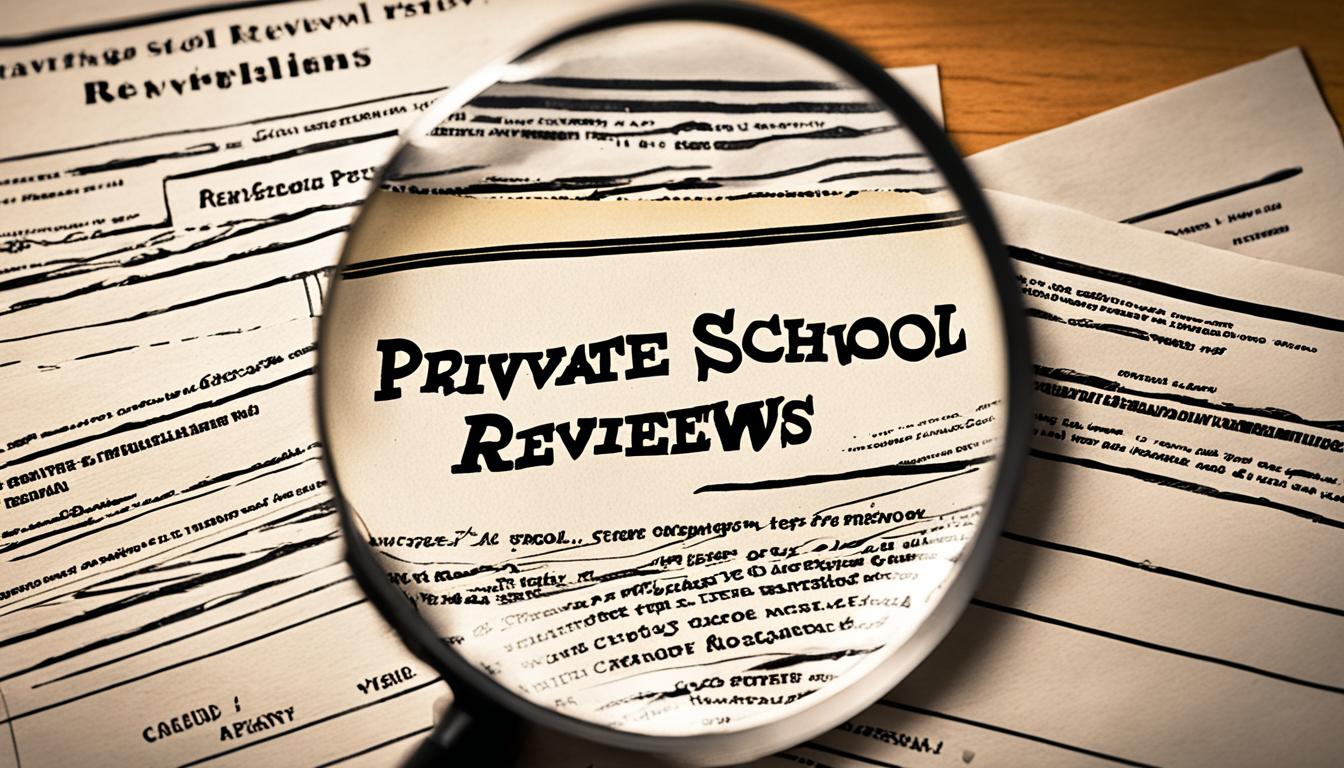Educational Excellence Unveiled of Navigating Private School Reviews for Informed Choices
Choosing the right school for your child is a decision that can shape their future. Parents often consider numerous factors, such as academic reputation, class size, extracurricular activities, location, and cost, to ensure they make the best choice. Private schools, in particular, are renowned for providing exceptional academic opportunities, with small class sizes, abundant resources, highly qualified teachers, and strong community involvement.
However, understanding the intricacies of private schools can be daunting. That’s where private school reviews come in. By exploring reviews of exclusive schools, ratings for private educational institutions, evaluations of independent schools, and feedback on elite educational facilities, parents can gain valuable insights to make informed decisions about their child’s education.
Key Takeaways:
- Private school reviews provide invaluable testimonials and evaluations to guide parents in their decision-making process.
- Factors to consider when choosing a private school include academic reputation, class size, extracurricular activities, location, and cost.
- Advantages of attending a private school include small class sizes, abundant resources, qualified teachers, and strong community involvement.
- Private and public schools differ in terms of funding, class sizes, teacher qualifications, curriculum flexibility, and parental involvement.
- Private school reviews ensure that parents can navigate the options available and secure the best educational opportunities for their children.
Factors to Consider When Choosing a Private School
When it comes to choosing a private school for your child, there are several important factors to consider. Each factor plays a crucial role in determining the best educational environment for your child to thrive in. By carefully evaluating these factors, you can make an informed decision that aligns with your child’s needs and your family’s values.
Academic Reputation
The academic reputation of a private school is a key consideration. Look for schools with a strong track record of academic excellence, as this reflects their commitment to providing high-quality education. Research their performance on standardized tests, college admissions rates, and any awards or recognition they have received.
Class Size
The class size at a private school can significantly impact your child’s learning experience. Smaller class sizes often allow for more individualized attention from teachers, fostering a supportive and engaging environment. This enables teachers to better understand each student’s strengths, weaknesses, and learning styles.
Extracurricular Activities
Extracurricular activities play a vital role in a well-rounded education. Look for schools that offer a diverse range of extracurricular activities, such as sports, arts, music, clubs, and community service. These activities can enhance your child’s social, physical, and emotional development, promoting holistic growth.
Location
The location of a private school is an essential factor to consider. Consider the proximity to your home or workplace, as it can impact your daily routine and your child’s commute. Additionally, think about the community and resources available in the surrounding area, as they can contribute to your child’s overall educational experience.
Cost
Private schools often come with a cost, so it’s essential to evaluate your budget and consider the financial implications. Research the tuition fees and any additional expenses associated with the school, such as uniforms, textbooks, transportation, and extracurricular fees. Explore potential financial aid options or scholarships that may be available.
“Choosing the right private school for your child is a decision that requires careful thought and consideration. By assessing key factors such as academic reputation, class size, extracurricular activities, location, and cost, you can ensure that you’re making a well-informed choice that aligns with your child’s educational needs.”
Advantages of Attending a Private School
Attending a private school offers several advantages that contribute to a high-quality education for students. These advantages include small class sizes, access to more resources, better qualified teachers, stronger community involvement, and individualized attention.
Small class sizes: One major advantage of private schools is the small class sizes, which allow for more personalized attention from teachers. With fewer students in each class, teachers can focus on the individual needs of each student, provide targeted instruction, and foster a collaborative learning environment.
More resources: Private schools often have more resources available compared to public schools. These resources can include advanced technology, specialized equipment, and a wide range of extracurricular programs. This abundance of resources provides students with enhanced learning opportunities and a well-rounded educational experience.
Better qualified teachers: Teachers in private schools are typically highly qualified and have expertise in their respective fields. Many private school teachers hold advanced degrees and are passionate about their subjects. Their expertise and dedication contribute to a higher standard of education and support student success.
Stronger community involvement: Private schools tend to have a stronger sense of community involvement compared to public schools. Active parent participation and support create a collaborative partnership between the school and families. This strong community involvement fosters a supportive and nurturing learning environment, ultimately benefiting the students.
Individualized attention: Private schools prioritize individualized attention for each student. With smaller class sizes and a focus on the unique needs of each student, teachers can tailor their instruction to cater to individual learning styles, interests, and abilities. This individualized attention allows students to thrive academically and reach their full potential.
Overall, attending a private school provides numerous advantages that contribute to an enriching educational experience. The combination of small class sizes, more resources, better qualified teachers, stronger community involvement, and individualized attention sets private schools apart in delivering a high-quality education. Students in private schools are well-supported, challenged, and prepared for success in their academic and personal lives.

Note: The image above depicts the many advantages of attending a private school, such as small class sizes and individualized attention.
| Advantages | Public Schools | Private Schools |
|---|---|---|
| Class Sizes | Large, often overcrowded | Small, allowing for personalized attention |
| Resources | Limited resources | Abundance of resources |
| Teacher Qualifications | Varying qualifications | Highly qualified teachers with expertise |
| Community Involvement | Varies depending on the community | Strong community involvement and parent support |
| Individualized Attention | Limited capacity for individualized attention | Personalized attention tailored to each student |
The table above highlights the key differences between public and private schools, further emphasizing the advantages of attending a private school.
Differences Between Private and Public Schools
Private schools and public schools have several key differences. These differences can significantly impact the educational experience and opportunities available to students.
Funding
One major difference between private and public schools is the way they are funded. Private schools rely on tuition fees, donations, and endowments to finance their operations. In contrast, public schools are funded by the government through taxes. This difference in funding often has implications for the resources and facilities available to students in each type of school.
Class Sizes
Another significant difference is class sizes. Private schools typically have smaller class sizes compared to public schools. This allows for more individualized attention and interaction with teachers, providing students with a more personalized learning experience. Smaller class sizes can also contribute to a stronger sense of community within the school.
Teacher Qualifications
The qualifications of teachers can also differ between private and public schools. In private schools, teachers often have higher qualifications, with many holding advanced degrees in their subject areas. This enhanced level of expertise can positively impact the quality of instruction and student learning outcomes.
Curriculum Flexibility
Private schools often have more flexibility in designing and implementing their curriculum. They can tailor their programs to meet the specific needs and interests of their students, providing a more customized educational experience. This flexibility can allow private schools to offer specialized programs, advanced courses, or unique learning opportunities that may not be available in public schools.
Parental Involvement
Parental involvement tends to be higher in private schools. Private schools often prioritize strong partnerships between parents and the school community. This increased involvement can take the form of volunteering, participating in school activities, and being actively engaged in decision-making processes. Parental involvement fosters a collaborative and supportive learning environment.
Overall, the differences between private and public schools encompass funding, class sizes, teacher qualifications, curriculum flexibility, and parental involvement. These factors contribute to distinctive educational experiences and choices for students and families.

Conclusion
Private school reviews are an invaluable resource for parents seeking to make well-informed decisions about their child’s education. With so many educational choices available, these reviews provide valuable insights and feedback that can guide parents in selecting the best private school for their child.
By considering factors such as academic reputation, class size, extracurricular activities, location, and cost, parents can ensure that their child receives a high-quality education in an environment that aligns with their individual needs and goals.
Private school reviews offer testimonials and evaluations from other parents, giving parents the opportunity to learn from the experiences of others and make a more confident decision. The knowledge gained from these reviews allows parents to navigate the various options available to them and ultimately make an informed choice.
When it comes to educational choices, understanding the advantages of private schools and the differences between private and public schools is crucial. Private schools often offer small class sizes, more resources, better qualified teachers, and stronger community involvement. These factors contribute to a supportive and nurturing learning environment that fosters academic excellence and personal growth.
In conclusion, private school reviews empower parents to make informed decisions, ensuring that their child receives the best possible education. By utilizing these reviews and considering the factors that matter most, parents can confidently choose a private school that aligns with their values, goals, and aspirations for their child’s future.
FAQ
What factors should I consider when choosing a private school?
When choosing a private school, factors such as academic reputation, class size, extracurricular activities, location, and cost should be considered.
What are the advantages of attending a private school?
Attending a private school offers advantages such as small class sizes, more resources, better qualified teachers, stronger community involvement, and individualized attention.
What are the differences between private and public schools?
Some key differences between private and public schools include funding, class sizes, teacher qualifications, curriculum flexibility, and parental involvement.
How can private school reviews help guide my decision?
Private school reviews provide valuable insights and feedback that can guide parents in making informed decisions about their child’s education.

